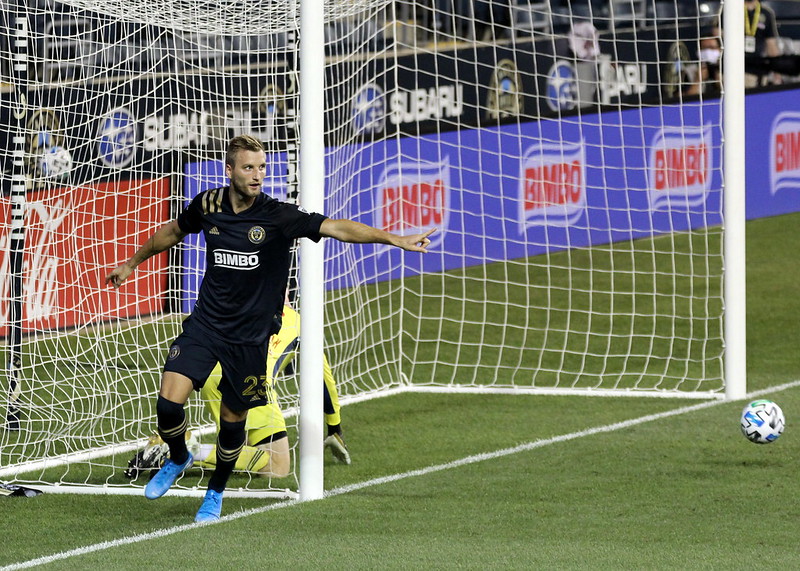Photo: Paul Rudderow
Remember back in the spring when a Union player became on of the first professional athletes to test positive for COVID-19?
It was April 1, and it was no April Fool’s joke. The team managed the situation, kept players and staff apart, and didn’t release the name of the afflicted. It was textbook virus mitigation, and a case perhaps in the difference between common athletic injury disclosure and Health Insurance Portability and Accountability Act laws for medical privacy (one of the key pieces of which is about consent: a person can share whatever medical information he or she wishes to share, but no one else can do so without permission).
Six weeks later, Union fans found out that the afflicted player was forward Kacper Pryzbylko. He was healthy and fully recovered, ready to get back in with his side. Fans found out because the Striker Muffin chose to tell fans what he went through, not because the team or the league decided he should or needed to.
Major League Soccer followed a similar strategy in the build-up to the MLS is Back Tournament, noting positive case numbers but not the names of individuals who tested positive.
A competitive advantage
This week, college football coach Lincoln Riley suggested that his team (as well as many others in the first division ranks thus far) would follow similar protocol to the Union’s. The major difference in Riley’s announcement was that keeping the names of afflicted players out of the public sphere was done in pursuit not of privacy but of “a competitive advantage.”
https://twitter.com/jasonkersey/status/1303381363391893512?s=20
Language matters in these situations, and frankly the highly regarded and up-and-coming Riley missed the mark. Being coy about the extent of a sprained ankle is altogether different than doing so about a disease that has killed nearly 200,000 Americans. To conflate the two, or to suggest that a meteoric sized asterisk isn’t already floating over each of these sports matches because of the impact of the virus, is simply incorrect.
Incorrect yes, and yet all very predictable.
On The All 3 Points Podcast several months ago, this author posited a scenario in which teams would start to mask their positive COVID tests in order to have a potentially afflicted player suit up for a big game.
Perhaps the test was a false positive, the doctors switched the charts, etc…
The example given at that stage was one of star Clemson quarterback Trevor Lawrence testing positive the week before the biggest game of his team’s season (at that stage, a November trip to South Bend, IN to meet Notre Dame) and the task required by those in charge to keep him off the team charter. It’s hard to believe a coach would sit a player of such importance for that magnitude of competition, and given the choice to mask who is positive and who is not, some measure of plausible deniability springs forth in the team’s ability to do so and simultaneously deflect blame or criticism.
The whole thing feels slimy, doesn’t it? A trainer can tape an ankle or give an injection to ease the pain. Why couldn’t that same person just screw on a full-face shield and say the player prefers glare reduction and protection from the risk of other players.
Slimy.
Winning is everything
Here’s the thing.
This is probably correct by any privacy standards. In the zero sum game of big time athletics, teams are looking for any and all “competitive advantages,” and cries of cheating, bag men (boosters who pay recruits to come to their school), paid off officials, and more are just part for the course in an average calendar year.
Add a pandemic and hundreds of millions of dollars in lost revenue and all bets are off.
The Union didn’t suit up with Pryzbylko while he was still contagious because there weren’t any games, they didn’t have to make that choice: the league was shut down, and by the time they got to the bubble their protocols worked and no one was forced to make that call.
Someone in one of the major leagues is going to have to make this call however, because in this moment in history, this kind of scenario is an inevitability. The Miami Marlins failed the test in the spring when they lied about a positive test in their locker room, played games afterward, and put their season, as well as those of the Phillies, Yankees, and others, at risk.
When the time comes, the call has to be about health and not competition.


Unfortunately, it’s probably going to take one or more deaths followed by successful lawsuits before some teams take this seriously.